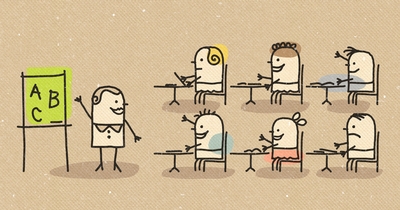The jury’s still out, as they say.
Everyone, though, agrees on one fact: The current (and sad) state of American education. After that, there’s zip consensus, with remedies as wide ranging as our demographics, from charter schools and online curricula to the strict disciplines and draconian demands of the early to mid-20th century.
Our take: No one’s right. And no one agrees.
What bothers us most about this ongoing, never-settled argument are the implications for us, as mentors, coaches, and teachers for our professions. A healthy debate, according to our thinking, should be about forever learning, or life-long education. The skills and knowledge we accrue throughout our earlier business years only serves as a great foundation for continuing to feed ourselves intellectually.
Yet there’s always a but.
All these ruminations got started when we volunteered last year as teaching assistants in an urban Midwestern elementary school. Now we’re interacting with what might be would-be communicators and designers and marketers of tomorrow.
 It’s not pretty. Kids can’t spell, can’t read, can’t do simple math – in spite of one-on-one work and patient repetitions and drills. They do like to draw, and express themselves freely when asked for visual representations of concepts and numbers. And they’re extremely voluble, looking for conversations about home and life and the world. But not about school and education.
It’s not pretty. Kids can’t spell, can’t read, can’t do simple math – in spite of one-on-one work and patient repetitions and drills. They do like to draw, and express themselves freely when asked for visual representations of concepts and numbers. And they’re extremely voluble, looking for conversations about home and life and the world. But not about school and education.
What does that mean for us as practitioners? Where are the future change leaders and branding experts? And how do we engage our staff, our teams in not only helping them learn and grow, but supporting others in their brain- and capability-building efforts?
It’s a puzzlement. And a very personal responsibility that begs for hearing about lessons learned – from others.
